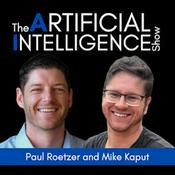152 episodes
- In this episode of No Priors, Sarah and Elad dive into the evolving landscape of software, exploring how AI is transforming the traditional SaaS model. They discuss whether SaaS as we know it is coming to an end, what new business and sales strategies are emerging, and how AI is reshaping the way software is built, sold, and scaled. The conversation also examines whether or not these shifts are a good thing for both big and small companies, and how coders and software experts are reacting to abrupt AI transitions. They also dig into how AI is reshaping sales, automating workflows, and enabling more predictive customer strategies. Beyond individual companies, they examine how tech giants are increasingly dominating the S&P 500, and what this concentration of power means for the future of startups, innovation, and the broader entrepreneurial ecosystem.
Sign up for new podcasts every week. Email feedback to [email protected]
Follow us on Twitter: @NoPriorsPod | @Saranormous | @EladGil |
Chapters:
00:00 – Cold Open
00:35 – The SaaS-polcalypse discussion
4:55 – AI Change Management in Large vs. Small Companies
05:43 – “Is Software Eating the World?”
08:38 – Addressing the Unsolved Problems
14:00 – The Noise of the Last Month vs. Excitement
21:32 – What Proportion of GDP is Tech?
23:20 – Market Cap Shifts
25:02 – As a Company, When Should You Sell?
29:05 – Multi-Product Bundle Defense
30:45 – Conclusion Rivian’s Roadmap to AI Architecture and Autonomy with Founder and CEO RJ Scaringe
12/2/2026 | 31 mins.Autonomous vehicle technology has moved past human-coded rules and into an era of neural networks and custom computer chips. And to solve the most difficult driving scenarios, electric vehicle company Rivian abandoned its original technology platform to build a vertically integrated data stack. Sarah Guo sits down with Rivian Founder and CEO RJ Scaringe to explore the seismic shift in the automotive industry toward AI-driven, software-defined vehicles . RJ discusses the move away from function or domain-based architecture for vehicle electronic systems to software-defined architecture, which allows for dynamic, monthly updates to features in Rivian’s vehicles. RJ also talks about the upcoming launch of Rivian’s R2 model, which aims to be a distinct, affordable, mass-market alternative to the Tesla Model Y. Plus, RJ shares his vision for a future where vehicles don’t just drive us, but inspire personal freedom and exploration.
Sign up for new podcasts every week. Email feedback to [email protected]
Follow us on Twitter: @NoPriorsPod | @Saranormous | @EladGil | @RJScaringe | @Rivian
Chapters:
00:00 – Cold Open00:35 – RJ Scaringe Introduction0:58 – Rivian’s Autonomy Evolution05:19 – Why Rivian’s Tech is Vertically Integrated10:06 – Levels of Autonomous Driving Technologies14:00 – Importance of a Software-Defined Architecture19:28 – Differentiating Autonomous Vehicle Models23:20 – R2: The First Mass Market Autonomous Vehicle25:02 – Do Americans Want EVs?29:05 – How Our Relationship to Vehicles is Evolving30:45 – ConclusionIntroducing 4D Creation Open Beta: NPCs, 4D Worlds, and the Future of Gaming with Roblox CEO Dave Baszucki
05/2/2026 | 43 mins.From “virtual doppelgängers” to “real-time dreaming,” online gaming platform Roblox is using AI technology to build the “Holodeck” envisioned in science fiction decades ago. Sarah Guo and Elad Gil sit down with Roblox CEO Dave Baszucki at Roblox headquarters to explore the intersection of AI, physics simulation, and the future of human connection. Dave discusses the evolution of the 4D creation tool in Roblox, a high-fidelity simulation that enables thousands of people to interact in real-time with photo-realistic graphics and acoustic physics. Dave reveals how Roblox is leveraging 13 billion hours of monthly user data to train native AI models that go beyond simple LLMs, enabling NPCs that can navigate and play games with human-like intuition. He also talks about how immersive communication will change video conferencing, how Roblox searches for unlikely talent outside of traditional elite universities, and how he balances rapid weekly iterations with keeping a “long view” on Roblox’s vision.
Sign up for new podcasts every week. Email feedback to [email protected]
Follow us on Twitter: @NoPriorsPod | @Saranormous | @EladGil | @DavidBaszucki | @Roblox
Chapters:
00:00 – Cold Open
00:36 – Dave Baszucki Introduction
01:16 – Realizing Robolox’s 20-Year Vision
05:29 – Using 4D Immersive Simulations in Virtual Interactions
08:22 – Physics Engine vs. Photorealism
11:50 – Storing Roblox History as Vector Data
14:00 – Training NPCs - Moving Beyond LLMs
18:05 – The Future of the Game Designer
19:54 – Video Latent World Models
23:53 – Social Simulation - AI Companions and Virtual Relationships
27:26 – Why Asset Costs Haven’t Changed the Gaming Industry
29:52 – AI Coding in Roblox Studio
31:36 – The Roblox Creator Economy
33:57 – Long-Term Conviction vs. Weekly Iteration
37:50 – Dave’s Hiring Philosophy for Roblox
43:44 – ConclusionWhy Cryopreservation is No Longer Science Fiction with Until Co-founder and CEO Laura Deming
29/1/2026 | 30 mins.What if we could pause biological time to wait for a cure for a disease? Thanks to innovations and research in reversible cryopreservation, this possibility is no longer just science fiction. Sarah Guo sits down with Laura Deming, CEO and co-founder of biotech startup Until, to dive deep into the growing field of reversible cryopreservation. Laura talks about how her time as a Thiel Fellow as well as her founding of the Longevity Fund fueled her obsession with solving the “social blindspot” of aging. Laura details how her new startup, Until, seeks to build tools that allow for “pressing pause” on biological time, starting with human organs with the hopes of scaling up to full body medical hibernation. Together, they also discuss why ice is the enemy of tissue, using engineering tools to help solve biological problems, and how this technology may revolutionize organ transplantation by removing time as a variable.
Sign up for new podcasts every week. Email feedback to [email protected]
Follow us on Twitter: @NoPriorsPod | @Saranormous | @EladGil | @LauraDeming | @untillabs
Chapters:
00:00 – Cold Open
01:08 – Laura Deming Introduction
01:53 – Why Laura Focused on Cryo Preservation and Longevity
06:20 – Bringing on Co-Founder Hunter Davis
07:55 – Until’s Goal
10:10 – Other Use Cases for Cryo Technology
12:22 – Scientific Challenges in Cryo Tech
15:36 – Using Engineering Principles to Solve Biological Problems
20:18 – Scaling Up Cryo Preservation
21:48 – Leading and Recruiting at Until
25:02 – Why Hasn’t Cryo Tech Been Worked On More?
27:14 – Making Time Not a Variable in Organ Transplants
29:06 – Changing How the Molecular World is Depicted
30:47 – ConclusionNo Priors Live: Building Durable Software in the AI Age with MongoDB President & CEO CJ Desai
22/1/2026 | 36 mins.Why are there only a handful of companies in the world with over $10 billion in pure-play software revenue? CJ Desai believes the reason is that products are replaceable, but platforms are forever. For No Priors’ very first live from MongoDB.local SF, Sarah Guo is joined by CJ Desai, CEO and President of software developer MongoDB, to discuss the shifting landscape of enterprise software. CJ discusses whether AI will erode the value of software, and what truly constitutes a “moat” in the age of generative AI. CJ also talks about why AI adoption with Fortune 500-sized companies is still lagging, the importance of customer relationships, and why the “bear thesis” on SaaS may be overblown.
Sign up for new podcasts every week. Email feedback to [email protected]
Follow us on Twitter: @NoPriorsPod | @Saranormous | @EladGil | @cj_mongodb | @MongoDB
Chapters:
00:00 – Cold Open
00:58 – CJ Desai Introduction
01:38 – The AI Stack and the Future of Software
04:18 – Why Platforms, Not Products, Are Sticky
09:59 – Vibe Coding and the Threat of On-Demand Apps
12:15 – Paths to Success for Software Vendor Incumbents
14:24 – How CJ Chose MongoDB
18:55 – Debunking the SaaS Bear Thesis
22:07 – Fortune 500 Perspectives on AI Value
24:24 – Can AI Native Startups Replace Systems of Record?
28:10 – The Importance of Customer Relationships
31:46 – Managing Through Massive Technology Transitions
36:37 – Conclusion
More Business podcasts
Trending Business podcasts
About No Priors: Artificial Intelligence | Technology | Startups
At this moment of inflection in technology, co-hosts Elad Gil and Sarah Guo talk to the world's leading AI engineers, researchers and founders about the biggest questions: How far away is AGI? What markets are at risk for disruption? How will commerce, culture, and society change? What’s happening in state-of-the-art in research? “No Priors” is your guide to the AI revolution. Email feedback to [email protected].
Sarah Guo is a startup investor and the founder of Conviction, an investment firm purpose-built to serve intelligent software, or "Software 3.0" companies. She spent nearly a decade incubating and investing at venture firm Greylock Partners.
Elad Gil is a serial entrepreneur and a startup investor. He was co-founder of Color Health, Mixer Labs (which was acquired by Twitter). He has invested in over 40 companies now worth $1B or more each, and is also author of the High Growth Handbook.
Podcast websiteListen to No Priors: Artificial Intelligence | Technology | Startups, The Curve and many other podcasts from around the world with the radio.net app

Get the free radio.net app
- Stations and podcasts to bookmark
- Stream via Wi-Fi or Bluetooth
- Supports Carplay & Android Auto
- Many other app features
Get the free radio.net app
- Stations and podcasts to bookmark
- Stream via Wi-Fi or Bluetooth
- Supports Carplay & Android Auto
- Many other app features


No Priors: Artificial Intelligence | Technology | Startups
Scan code,
download the app,
start listening.
download the app,
start listening.







































